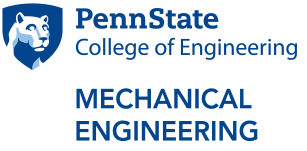Technical Electives Course Descriptions
ME 400: Thermodynamics of Propulsion and Power Systems (3 cr)
Fall Semester
Analysis and modeling of propulsion and power systems, including combustion, compressible flow through nozzles, chemical equilibrium, and moist air systems. Prerequisites: ME 300; ME 320. Prerequisite or concurrent: ME 410. Sample syllabus »
ME 404: Gas Turbines (3 cr)
Fall Semester
Thermodynamic cycles relating to gas turbines; analysis and performance of compressors, combustion chambers, single- and multi- stage turbines; recent developments. Prerequisites: ME 320. Sample syllabus »
ME 405: Indoor Air Quality Engineering (3 cr)
Fall Semester
Prediction of the motion of contaminants (both gaseous particulate) in gas streams; analysis of ventilation systems and air pollution control systems; comparison of experimental sampling techniques. Prerequisite: ME 320. Sample syllabus »
ME 420: Compressible Flow I (3 cr)
Fall Semester
Introductory compressible flow (gas dynamics), mathematical background, and physical concepts of isentropic flow, shock waves, expansion waves, and applications. Prerequisite: ME 320. Sample syllabus »
ME 422: Principles of Turbomachinery (3 cr)
Spring Semester
Application of Newton’s laws of motion and basic laws of thermodynamics to analysis of fluid flow in turbomachinery. Prerequisite: ME 320. Sample syllabus »
ME 427: Aerodynamics for Mechanical Engineers (3 cr)
Spring Semester
The primary objective of this course is to teach students how to apply concepts relating to incompressible flows to solve aerodynamic design problems. Prerequisite: ME 320. Sample syllabus »
ME 430 (EGEE 430): Introduction to Combustion (3 cr)
Fall and Spring Semesters
Concepts related to laminar and turbulent premixed and non-premixed combustion with applications to propulsion and stationary systems. Prerequisites: ME 201 or ME 300 or EME 301. Sample syllabus »
ME 431: Internal Combustion Engines (3 cr)
Fall Semester
Thermodynamic aspects of internal combustion engine design and performance; two- and four-stroke cycle, supercharged and non-supercharged, diesel and spark-ignition types. Sample syllabus »
ME 432: Rocket Propulsion (3 cr)
Spring Semester
Overview of underlying theories and design practices of chemical and non-chemical rocket propulsion systems. The topical areas include basic thermodynamics and gas dynamics, propellant formulation and characterization, component and system designs, and test evaluation. At the conclusion of this course, students will have obtained fundamental knowledge and design rules of various rocket propulsion systems, including solid, liquid, and hybrid rockets, as well as electric propulsion engines. Prerequisite: ME 300 or ME 320. Sample syllabus »
ME 433: Fundamentals of Air Pollution (3 cr)
Spring Semester
Natural and man-made sources of pollution; atmospheric dispersion; biological and health effects; control systems; legislation and regulations. Prerequisite: ME 201 or ME 300. Sample syllabus »
ME 452: Vehicle Dynamics (3 cr)
Spring Semester
Investigations of three-dimensional dynamics and design into the study of vehicle dynamics including tire forces, suspension, and stability. Prerequisite: ME 370. Prerequisite or concurrent: ME 450. Sample syllabus »
ME 455: Automatic Control Systems (3 cr)
Spring Semester
Dynamic analysis of systems involving automatic control of position, speed, power, flow, pressure, temperature, and other physical quantities. Prerequisites: ME 320; ME 450. Sample syllabus »
ME 456 (IE 456): Introduction to Robotics (3 cr)
Fall Semester
Introduction to robotics, with emphasis on robot selection, programming, and economic justification for manufacturing applications. Prerequisites: MATH 220; MATH 250 or MATH 251; I E 305 or ME 360; CMPSC 200 or CMPSC 201. Sample syllabus »
ME 459: Machine Learning in Mechanical Engineering (3 Cr)
Fall Semester
This course is designed to equip mechanical engineering students with the essential skills to bridge the gap between theoretical machine-learning models and real-world mechanical engineering challenges. Prerequisite CMPSC 200. Sample syllabus »
ME 460: Advanced Machine Design Problems (3 cr)
Spring Semester
Special machine design problems in unusual type springs; gear problems and involutometry; cam design and application; multiple diameter shaft deflections and ball bearings. Prerequisite: ME 360; ME 370. Sample syllabus »
ME 461: Finite Elements in Engineering (3 cr)
Fall and Spring Semesters
Computer modeling and fundamental analysis of solid, fluid, and heat flow problems using existing computer codes. Prerequisites: CMPSC 200, CMPSC 201 or CMPSC 202; E MCH 213, E MCH 210 or E MCH 210H. Sample syllabus »
ME 480: Mechanism Design and Analysis (3 cr)
Spring Semester
Design and analysis of mechanical linkages including kinematic synthesis and dynamic analysis. Linkages for a variety of applications are considered. Prerequisite: E MCH 212. Prerequisite or Concurrent: CMPSC 200. Sample syllabus »
ME 481: Introduction to Computer-Aided Analysis of Machine Dynamics (3 cr)
Spring Semester
Techniques and formulations for computer based kinematic and dynamic analyses of machines. Prerequisite: E MCH 212. Prerequisite or Concurrent: CMPSC 200. Sample syllabus »
ME 493 and 494H: Senior Honors Thesis (6 cr max)
The Senior (Honors) Thesis is a requirement for students participating in the Schreyer Honors Program in Mechanical Engineering. It is a valuable component of the entire honors program for the student participating in this program — using, extending, and integrating what he/she has learned, developing a sense of mastery of information and knowledge, and providing an achievement worth noting. Up to six credits of honors coursework may be devoted to thesis preparation (5 credits for ME 494H and 1 credit for ME 493). Though department policy a thesis supervisor may approve fewer than six credits, in no case may more than six honors credits be earned for a thesis. For students in the Schreyer Honors Program, five credits of senior thesis and one credit of ME 493 may be substituted for:
- 3 credits of Engineering Technical Elective (ETE) and 3 credits of General Technical Elective (GTE).
The Honor’s Thesis capstone experience approval form can be downloaded at M E 494H Thesis Substitution Registration Form.
ME 496: Independent Studies (1-6 cr)
Students engaged in independent study under the supervision of an ME faculty member may use up to 6 credits of ME 496 for the Engineering Technical Elective requirement (ETE) or General Technical Elective (GTE). Students cannot register for ME 496 without having made arrangements with a faculty member and receiving the permission of the student’s adviser. In addition to registering for ME 496, a Project Registration form must be submitted in 139/140 Reber Building. The Department requires that students have an overall GPA not less than a 3.0 to enroll in ME 496.
ME 497: Special Topics
New or experimental courses will be offered from time to time as an ME 497X course.
- Contact Us
- Academic Plans
- Core Courses
- Technical Electives
- Technical Electives Course Descriptions
- Technical Elective Groupings






